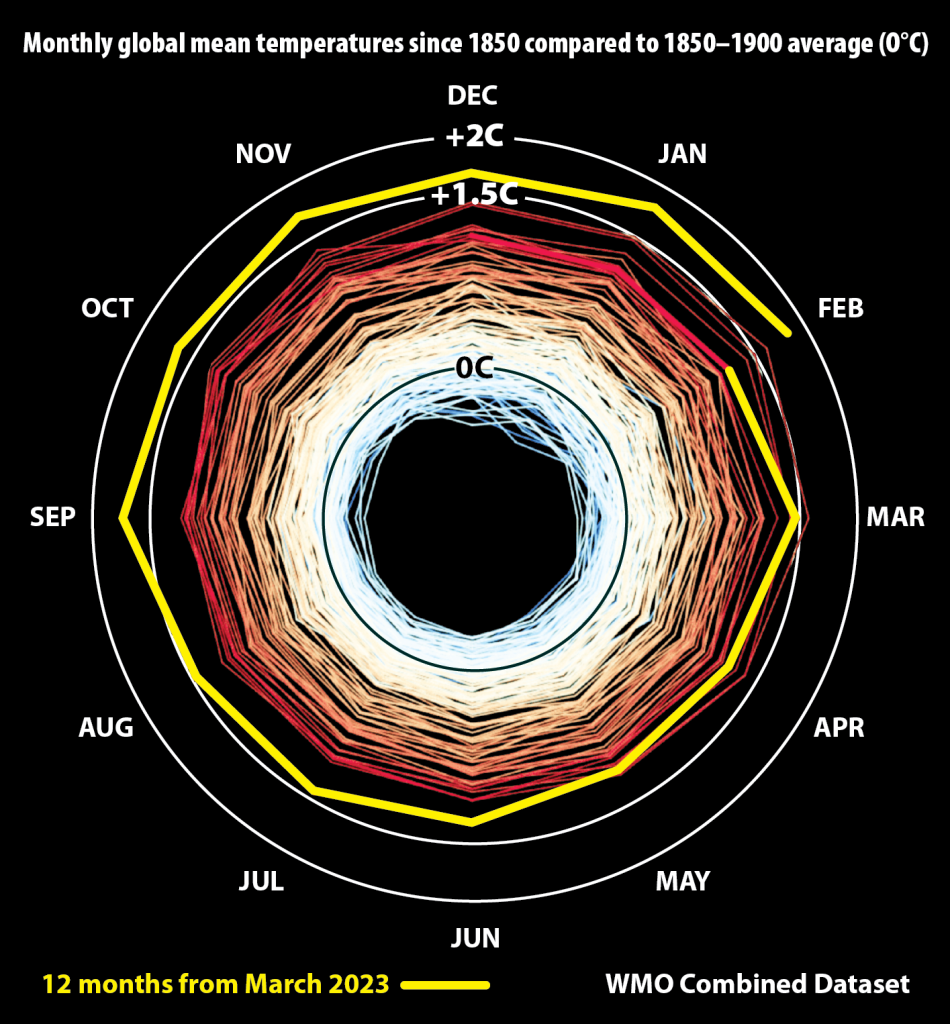Five days before Tasmanians went to the polls on Saturday, the World Meteorological Organisation identified what ought to be the runaway top issue of every election campaign in every jurisdiction the world over – Earth’s surface is now above the “safe” global warming limit of 1.5C.
Every indicator is sounding alarms, said the WMO in its yearly report released last Wednesday. A day earlier, its monthly update noted that in February the global average surface temperature was 1.77C above the pre-industrial reference period of 1850 to 1900. If the March figure is in similar territory, we will have experienced a 12-month period averaging above 1.5C of warming. This is a shocking turn of events.

The end of El Niño might deliver a reprieve, but current record-high ocean temperatures indicate this will only be temporary. Our historically stable global climate is now in an indefinite period of instability, and we’re perilously close to the point where no political party, even in a sophisticated economy like ours, will be able to ignore the impact of climate change.
But we’re not there yet. On the day the WMO report came out, in their leaders’ debate Premier Jeremy Rockliff and Opposition Leader Rebecca White discussed housing, health, education and training, recreational fishing, and above all, an AFL stadium, with the environment getting a cursory mention. Climate change was nowhere to be seen.
The Greens aside, no party or individual candidate across the spectrum took on climate change as a major issue of concern. Perhaps they think it’s something for bigger fish to attend to, too big and all-encompassing for a state election. Some may even think it’s all just hot air.
However, some people and communities in Tasmania hear the urgency in the international climate reports and see climate change looming ominously above their children’s future – and also above their own lives now. They see that established political processes and institutions are struggling with this enormous challenge and that waiting for authorities to act will leave us far short of what’s needed.
One notable example is the community scattered along the D’Entrecasteaux Channel coast and hinterland, loosely based in Kettering. Guided by a well-established group of climate watchers chaired by semi-retired businessman Phil Tomney, people of the Channel have set up their own sustainability and resilience support group, called Net Zero Channel (NZC), formed in May 2022 and incorporated three months later.
These are people who see the limitations of our political institutions and processes and are determined not to leave the future entirely in the hands of those we elect to office or the bureaucrats who do their bidding. In a nutshell, they’re activists – not a word beloved of many in authority, but one that’s becoming increasingly relevant.
Their activism is on two levels. There’s the individual or household level, where they do things to their homes and lifestyles to make both more climate-friendly. They are solid supporters of a big national push for a federal universal finance scheme to help Australians electrify their home – the Electrify Everything Loans Scheme (EELS) developed by Rewiring Australia, an independent non-profit organisation led by entrepreneur-physicist Saul Griffith. We’ll be able to gauge the success of the EELS push when Treasurer Jim Chalmers hands down the federal budget next month.
NZC’s second focus is setting up its Channel community to lead the state in cutting emissions by coordinating households’ electrification efforts, preferably but not necessarily using EELS finance.
Rewiring Australia has already recognised the group’s work to date by selecting it as the sole Tasmanian volunteer organisation among 10 such groups Australia-wide to receive a small grant ($1000) and online help to spread the word around the Channel – and by extension more broadly – about electrifying to cut community emissions.
One of NZC’s first projects is an online survey exploring strategies to help the Channel region (read, all of Tasmania) to transition rapidly into renewable technologies, seeking information on your home energy circumstances, current and aspirational. The survey is easily accessed on the Net Zero Channel website (www.netzerochannel.org.au).
Initiatives like NZC’s have been supported for years by groups like Sustainable Living Tasmania, Climate Tasmania and the University of Tasmania’s Tasmanian Policy Exchange under Richard Eccleston, but their ideas keep getting lost in the swirl of power politics.
Yet the Greens and progressive independents were solidly supported in an election that saw the government vote plummet. On Saturday evening Greens leader Rosalie Woodruff spoke with conviction of the conservation movement’s continued success against big commercial and political interests. There is still hope.
